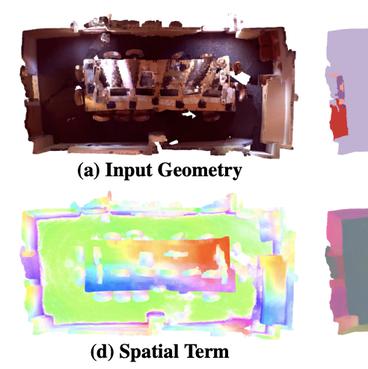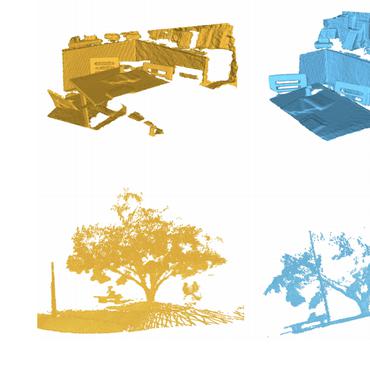Search Results for author: Gemma Roig
Found 34 papers, 16 papers with code
Tafsir Dataset: A Novel Multi-Task Benchmark for Named Entity Recognition and Topic Modeling in Classical Arabic Literature
no code implementations • COLING 2022 • Sajawel Ahmed, Rob van der Goot, Misbahur Rehman, Carl Kruse, Ömer Özsoy, Alexander Mehler, Gemma Roig
Various historical languages, which used to be lingua franca of science and arts, deserve the attention of current NLP research.
Multi-Source Open-Set Deep Adversarial Domain Adaptation
no code implementations • ECCV 2020 • Sayan Rakshit, Dipesh Tamboli, Pragati Shuddhodhan Meshram, Biplab Banerjee, Gemma Roig, Subhasis Chaudhuri
Besides, an adversarial learning strategy is followed to model the discriminator between the target-domain known and unknown classes.
Generative Adversarial Collaborations: A practical guide for conference organizers and participating scientists
no code implementations • 19 Feb 2024 • Gunnar Blohm, Benjamin Peters, Ralf Haefner, Leyla Isik, Nikolaus Kriegeskorte, Jennifer S. Lieberman, Carlos R. Ponce, Gemma Roig, Megan A. K. Peters
Generative adversarial collaborations (GACs) are a form of formal teamwork between groups of scientists with diverging views.
Different Algorithms (Might) Uncover Different Patterns: A Brain-Age Prediction Case Study
no code implementations • 8 Feb 2024 • Tobias Ettling, Sari Saba-Sadiya, Gemma Roig
Few of our models achieved state-of-the-art performance on the specific data-set we utilized.
Caregiver Talk Shapes Toddler Vision: A Computational Study of Dyadic Play
1 code implementation • 7 Dec 2023 • Timothy Schaumlöffel, Arthur Aubret, Gemma Roig, Jochen Triesch
For this we propose a computational model of visual representation learning during dyadic play.
Learning Class and Domain Augmentations for Single-Source Open-Domain Generalization
no code implementations • 5 Nov 2023 • Prathmesh Bele, Valay Bundele, Avigyan Bhattacharya, Ankit Jha, Gemma Roig, Biplab Banerjee
Single-source open-domain generalization (SS-ODG) addresses the challenge of labeled source domains with supervision during training and unlabeled novel target domains during testing.
Analyzing Vision Transformers for Image Classification in Class Embedding Space
1 code implementation • NeurIPS 2023 • Martina G. Vilas, Timothy Schaumlöffel, Gemma Roig
Inspired by previous research in NLP, we demonstrate how the inner representations at any level of the hierarchy can be projected onto the learned class embedding space to uncover how these networks build categorical representations for their predictions.
Net2Brain: A Toolbox to compare artificial vision models with human brain responses
1 code implementation • 20 Aug 2022 • Domenic Bersch, Kshitij Dwivedi, Martina Vilas, Radoslaw M. Cichy, Gemma Roig
We introduce Net2Brain, a graphical and command-line user interface toolbox for comparing the representational spaces of artificial deep neural networks (DNNs) and human brain recordings.
Using Sentence Embeddings and Semantic Similarity for Seeking Consensus when Assessing Trustworthy AI
1 code implementation • 9 Aug 2022 • Dennis Vetter, Jesmin Jahan Tithi, Magnus Westerlund, Roberto V. Zicari, Gemma Roig
Therefore, a core challenge of the assessment process is to identify when experts from different disciplines talk about the same problem but use different terminologies.
What do navigation agents learn about their environment?
1 code implementation • CVPR 2022 • Kshitij Dwivedi, Gemma Roig, Aniruddha Kembhavi, Roozbeh Mottaghi
We use iSEE to probe the dynamic representations produced by these agents for the presence of information about the agent as well as the environment.
Predicting emotion from music videos: exploring the relative contribution of visual and auditory information to affective responses
1 code implementation • 19 Feb 2022 • Phoebe Chua, Dimos Makris, Dorien Herremans, Gemma Roig, Kat Agres
In this paper we present MusicVideos (MuVi), a novel dataset for affective multimedia content analysis to study how the auditory and visual modalities contribute to the perceived emotion of media.
FRIDA -- Generative Feature Replay for Incremental Domain Adaptation
no code implementations • 28 Dec 2021 • Sayan Rakshit, Anwesh Mohanty, Ruchika Chavhan, Biplab Banerjee, Gemma Roig, Subhasis Chaudhuri
Inspired by the notion of generative feature replay, we propose a novel framework called Feature Replay based Incremental Domain Adaptation (FRIDA) which leverages a new incremental generative adversarial network (GAN) called domain-generic auxiliary classification GAN (DGAC-GAN) for producing domain-specific feature representations seamlessly.
 Generative Adversarial Network
Generative Adversarial Network
 Unsupervised Domain Adaptation
Unsupervised Domain Adaptation
AttendAffectNet–Emotion Prediction of Movie Viewers Using Multimodal Fusion with Self-Attention
1 code implementation • Sensors 2021 • Ha Thi Phuong Thao, B T Balamurali, Gemma Roig, Dorien Herremans
The models that use all visual, audio, and text features simultaneously as their inputs performed better than those using features extracted from each modality separately.
AttendAffectNet: Self-Attention based Networks for Predicting Affective Responses from Movies
1 code implementation • 21 Oct 2020 • Ha Thi Phuong Thao, Balamurali B. T., Dorien Herremans, Gemma Roig
In this work, we propose different variants of the self-attention based network for emotion prediction from movies, which we call AttendAffectNet.
Duality Diagram Similarity: a generic framework for initialization selection in task transfer learning
2 code implementations • ECCV 2020 • Kshitij Dwivedi, Jiahui Huang, Radoslaw Martin Cichy, Gemma Roig
In this paper, we tackle an open research question in transfer learning, which is selecting a model initialization to achieve high performance on a new task, given several pre-trained models.
Using Human Psychophysics to Evaluate Generalization in Scene Text Recognition Models
no code implementations • 30 Jun 2020 • Sahar Siddiqui, Elena Sizikova, Gemma Roig, Najib J. Majaj, Denis G. Pelli
Relative to the attention-based (Attn) model, we discover that the connectionist temporal classification (CTC) model is more robust to noise and occlusion, and better at generalizing to different word lengths.
LCD: Learned Cross-Domain Descriptors for 2D-3D Matching
1 code implementation • 21 Nov 2019 • Quang-Hieu Pham, Mikaela Angelina Uy, Binh-Son Hua, Duc Thanh Nguyen, Gemma Roig, Sai-Kit Yeung
In this work, we present a novel method to learn a local cross-domain descriptor for 2D image and 3D point cloud matching.
Predictive Coding Networks Meet Action Recognition
no code implementations • 22 Oct 2019 • Xia Huang, Hossein Mousavi, Gemma Roig
In this way, the model only relies on the video frames, and does not need pre-processed optical flows as input.
Latent space representation for multi-target speaker detection and identification with a sparse dataset using Triplet neural networks
1 code implementation • 1 Oct 2019 • Kin Wai Cheuk, Balamurali B. T., Gemma Roig, Dorien Herremans
When reducing the training data to only using the train set, our method results in 309 confusions for the Multi-target speaker identification task, which is 46% better than the baseline model.
Multimodal Deep Models for Predicting Affective Responses Evoked by Movies
1 code implementation • 16 Sep 2019 • Ha Thi Phuong Thao, Dorien Herremans, Gemma Roig
Interestingly, we also observe that the optical flow is more informative than the RGB in videos, and overall, models using audio features are more accurate than those based on video features when making the final prediction of evoked emotions.
The Algonauts Project: A Platform for Communication between the Sciences of Biological and Artificial Intelligence
no code implementations • 14 May 2019 • Radoslaw Martin Cichy, Gemma Roig, Alex Andonian, Kshitij Dwivedi, Benjamin Lahner, Alex Lascelles, Yalda Mohsenzadeh, Kandan Ramakrishnan, Aude Oliva
Recently, researchers of natural intelligence have begun using those AI models to explore how the brain performs such tasks.
Representation Similarity Analysis for Efficient Task taxonomy & Transfer Learning
2 code implementations • CVPR 2019 • Kshitij Dwivedi, Gemma Roig
We next evaluate the relationship of RSA with the transfer learning performance on Taskonomy tasks and a new task: Pascal VOC semantic segmentation.
Deep Anchored Convolutional Neural Networks
no code implementations • 22 Apr 2019 • Jiahui Huang, Kshitij Dwivedi, Gemma Roig
Convolutional Neural Networks (CNNs) have been proven to be extremely successful at solving computer vision tasks.
JSIS3D: Joint Semantic-Instance Segmentation of 3D Point Clouds with Multi-Task Pointwise Networks and Multi-Value Conditional Random Fields
1 code implementation • CVPR 2019 • Quang-Hieu Pham, Duc Thanh Nguyen, Binh-Son Hua, Gemma Roig, Sai-Kit Yeung
Deep learning techniques have become the to-go models for most vision-related tasks on 2D images.
 Ranked #2 on
3D Instance Segmentation
on SceneNN
Ranked #2 on
3D Instance Segmentation
on SceneNN
 3D Instance Segmentation
3D Instance Segmentation
 3D Semantic Instance Segmentation
+3
3D Semantic Instance Segmentation
+3
Few-Shot Regression via Learned Basis Functions
no code implementations • ICLR Workshop LLD 2019 • Yi Loo, Swee Kiat Lim, Gemma Roig, Ngai-Man Cheung
We show that our model outperforms the current state of the art meta-learning methods in various regression tasks.
DOPING: Generative Data Augmentation for Unsupervised Anomaly Detection with GAN
no code implementations • 23 Aug 2018 • Swee Kiat Lim, Yi Loo, Ngoc-Trung Tran, Ngai-Man Cheung, Gemma Roig, Yuval Elovici
To the best of our knowledge, our method is the first data augmentation technique focused on improving performance in unsupervised anomaly detection.
Do Deep Neural Networks Suffer from Crowding?
2 code implementations • NeurIPS 2017 • Anna Volokitin, Gemma Roig, Tomaso Poggio
Also, for all tested networks, when trained on targets in isolation, we find that recognition accuracy of the networks decreases the closer the flankers are to the target and the more flankers there are.
Herding Generalizes Diverse M -Best Solutions
no code implementations • 14 Nov 2016 • Ece Ozkan, Gemma Roig, Orcun Goksel, Xavier Boix
We show that the algorithm to extract diverse M -solutions from a Conditional Random Field (called divMbest [1]) takes exactly the form of a Herding procedure [2], i. e. a deterministic dynamical system that produces a sequence of hypotheses that respect a set of observed moment constraints.
Foveation-based Mechanisms Alleviate Adversarial Examples
no code implementations • 19 Nov 2015 • Yan Luo, Xavier Boix, Gemma Roig, Tomaso Poggio, Qi Zhao
To see this, first, we report results in ImageNet that lead to a revision of the hypothesis that adversarial perturbations are a consequence of CNNs acting as a linear classifier: CNNs act locally linearly to changes in the image regions with objects recognized by the CNN, and in other regions the CNN may act non-linearly.
Self-Adaptable Templates for Feature Coding
no code implementations • NeurIPS 2014 • Xavier Boix, Gemma Roig, Salomon Diether, Luc V. Gool
Within this processing pipeline, the common trend is to learn the feature coding templates, often referred as codebook entries, filters, or over-complete basis.
Comment on "Ensemble Projection for Semi-supervised Image Classification"
no code implementations • 29 Aug 2014 • Xavier Boix, Gemma Roig, Luc van Gool
In a series of papers by Dai and colleagues [1, 2], a feature map (or kernel) was introduced for semi- and unsupervised learning.
SEEDS: Superpixels Extracted via Energy-Driven Sampling
1 code implementation • 16 Sep 2013 • Michael Van den Bergh, Xavier Boix, Gemma Roig, Luc van Gool
We define a robust and fast to evaluate energy function, based on enforcing color similarity between the bound- aries and the superpixel color histogram.
Random Binary Mappings for Kernel Learning and Efficient SVM
no code implementations • 19 Jul 2013 • Gemma Roig, Xavier Boix, Luc van Gool
SVMs suffer from various drawbacks in terms of selecting the right kernel, which depends on the image descriptors, as well as computational and memory efficiency.
Sparse Quantization for Patch Description
no code implementations • CVPR 2013 • Xavier Boix, Michael Gygli, Gemma Roig, Luc van Gool
We demonstrate the capabilities of our formulation for both keypoint matching and image classification.












